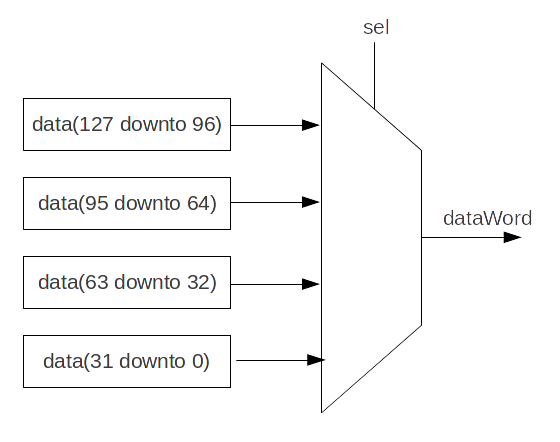When/Switch/Mux
When
As in VHDL and Verilog, signals can be conditionally assigned when a specified condition is met:
when(cond1) {
// Execute when cond1 is true
}.elsewhen(cond2) {
// Execute when (not cond1) and cond2
}.otherwise {
// Execute when (not cond1) and (not cond2)
}
Warning
If the keyword otherwise is on the same line as the closing bracket } of the when condition, no dot is needed.
when(cond1) {
// Execute when cond1 is true
} otherwise {
// Execute when (not cond1) and (not cond2)
}
But if .otherwise is on another line, a dot is required:
when(cond1) {
// Execute when cond1 is true
}
.otherwise {
// Execute when (not cond1) and (not cond2)
}
Switch
As in VHDL and Verilog, signals can be conditionally assigned when a signal has a defined value:
switch(x) {
is(value1) {
// Execute when x === value1
}
is(value2) {
// Execute when x === value2
}
default {
// Execute if none of precedent conditions met
}
}
is clauses can be factorized by separating them with a comma is(value1, value2).
Example
switch(aluop) {
is(ALUOp.add) {
immediate := instruction.immI.signExtend
}
is(ALUOp.slt) {
immediate := instruction.immI.signExtend
}
is(ALUOp.sltu) {
immediate := instruction.immI.signExtend
}
is(ALUOp.sll) {
immediate := instruction.shamt
}
is(ALUOp.sra) {
immediate := instruction.shamt
}
}
is equivalent to
switch(aluop) {
is(ALUOp.add, ALUOp.slt, ALUOp.sltu) {
immediate := instruction.immI.signExtend
}
is(ALUOp.sll, ALUOp.sra) {
immediate := instruction.shamt
}
}
Local declaration
It is possible to define new signals inside a when/switch statement:
val x, y = UInt(4 bits)
val a, b = UInt(4 bits)
when(cond) {
val tmp = a + b
x := tmp
y := tmp + 1
} otherwise {
x := 0
y := 0
}
Note
SpinalHDL checks that signals defined inside a scope are only assigned inside that scope.
Mux
If you just need a Mux with a Bool selection signal, there are two equivalent syntaxes:
Syntax |
Return |
Description |
|---|---|---|
Mux(cond, whenTrue, whenFalse) |
T |
Return |
cond ? whenTrue | whenFalse |
T |
Return |
val cond = Bool
val whenTrue, whenFalse = UInt(8 bits)
val muxOutput = Mux(cond, whenTrue, whenFalse)
val muxOutput2 = cond ? whenTrue | whenFalse
Bitwise selection
A bitwise selection looks like the VHDL when syntax.
Example
val bitwiseSelect = UInt(2 bits)
val bitwiseResult = bitwiseSelect.mux(
0 -> (io.src0 & io.src1),
1 -> (io.src0 | io.src1),
2 -> (io.src0 ^ io.src1),
default -> (io.src0)
)
Also, if all possible values are covered in your mux, you can omit the default value:
val bitwiseSelect = UInt(2 bits)
val bitwiseResult = bitwiseSelect.mux(
0 -> (io.src0 & io.src1),
1 -> (io.src0 | io.src1),
2 -> (io.src0 ^ io.src1),
3 -> (io.src0)
)
Alternatively, if the uncovered values are not important, they can be left unassigned by using muxListDc
muxLists(...) is another bitwise selection which takes a sequence of tuples as input. Below is an example of dividing a Bits of 128 bits into 32 bits:

val sel = UInt(2 bits)
val data = Bits(128 bits)
// Dividing a wide Bits type into smaller chunks, using a mux:
val dataWord = sel.muxList(for (index <- 0 until 4) yield (index, data(index*32+32-1 downto index*32)))
// A shorter way to do the same thing:
val dataWord = data.subdivideIn(32 bits)(sel)